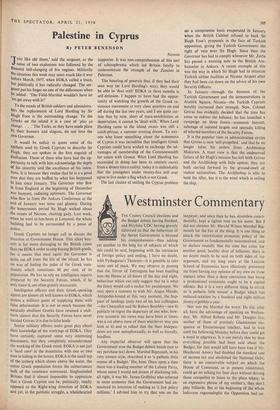Palestine in Cyprus
By PETER BENENSON um' like old times,' said the sergeant, as the noise of two explosions was followed by the frenzied bell-clanging of fire engines. Militarily the situation this week may seem much like it was before March, 1957, when EOKA called a truce, but politically it has radically changed. The ser- geant put his finger on one of the differences when be added : 'The Field-Marshal wouldn't have let em get away with it !'
To the minds of British soldiers and administra- tors the replacement of Lord Harding by Sir Hugh Foot is the outstanding change. To the Greeks on the island it is a case of 'plus cc: change. . . 2 The Turks, as they have made plain by their banners and slogans, do not love the new Governor.
It would be unfair to quote some of the epithets used by Greek Cypriots to describe Sir Hugh; they are spoken in the first anguish of disillusion. Those of them who have had the op- portunity to talk with him acknowledge the depth of his sincerity and the excellence of his inten- tions. It is because they realise that he is a a good man that they are baffled by what has happened to him since January. The Governor who flew in from England at the beginning of December Was buoyant, radiating optimism. The Governor Who flew in from the Ankara Conference at the end of January was tense and gloomy. During the honeymoon period Sir Hugh walked about the streets of Nicosia, chatting gaily. Last week, when he went to luncheon at Limassol, the whole building had to be surrounded by a posse of police.
Greek Cypriots no longer call to discuss the situation at Government House. This silent boy- cott is far more damaging to the British cause than the EOKA order to stop buying British goods, for it means that once again the Governor is quite cut off from the life of the island; he has no way of feeling the pulse of the Greek com- munity which constitutes 80 .per cent. of its Population. He has to rely on intelligence reports prepared by the Security Forces, which, if he only knew it, are often grossly inaccurate.
Intelligence officers and their Greek-speaking agents are almost all well known to EOKA, which makes a military point of supplying them with false information. It is not so much because the naturally ebullient Greeks have retained a stub- born silence that the Security Forces have never located Grivas; it is due to false leads.
Senior military officers make great play about their knowledge of the workings of EOKA. They have certainly captured some very interesting documents, but they completely misunderstand the working of the Greek mind. EOKA is not just a 'hard core' in the mountains with one or two men in hiding in the towns; EOKA is the small top of the iceberg which shows above the water, the entire Greek population forms the subterranean bulk of the resistance movement. Singleminded Britons find it almost impossible to appreciate that a Greek Cypriot can be, politically, totally opposed to the Right-wing direction of EOKA and yet, in the patriotic struggle, a wholehearted Nicosia supporter. It was non-comprehension of this sort of schizophrenia which led Britain fatally to underestimate the strength of the Zionists in Palestine.
The boasting of generals that, if they had their own way (or Lord Harding's way), they would be able to 'deal with' EOKA in three months is self-delusion. I happen to have had the oppor- tunity of watching the growth of the Greek re- sistance movement at very close quarters on and off during the last two years, and I am quite cer- tain that by now, short of mass-annihilation or deportation, it cannot be 'dealt with.' When Lord Harding came to the island enosis was still a catch-phrase, a summer evening dream. To any- one who knew something about the economics of Cyprus it was incredible that intelligent Greek Cypriots could have wished to exchange the ad- vantages of membership of the Commonwealth for union with Greece. What Lord Harding has succeeded in doing has been to convert enosis from a dream into a reality; today it is unthinkable that the youngsters under twenty-five will ever agree to live under a flag which is not Greek.
The last chance of settling the Cyprus problem on a compromise basis evaporated in January when the British Cabinet refused to back Sir Hugh Foot's proposals in the face of Turkish opposition, giving the Turkish Government the right of veto ever Sir Hugh. Since then the Governor has had to comply whenever Mr. Zorlu has passed a warning note to the British Am- bassador in Ankara. A recent example of this was the way in which Sir Hugh had to reinstate Turkish airline facilities at Nicosia Airport after they had been cut down on the advice of his own Security Officers.
In January—through the firmness of the Turkish Government and the demonstrations in Atattirk Square, Nicosia—the Turkish Cypriots notably increased their strength. Now, Colonel Grivas has evidently decided that the time has come to redress the balance; he has launched a campaign on three fronts—economic boycott, sabotage of isolated targets and sporadic killing of selected members of the Security Forces.
It is the popular view in administration circles that Grivas is now 'self-propelled,' and that he no longer takes his orders from Archbishop Makarios. A truer view is that the undeserved failure of Sir Hugh's mission has left both Grivas and the Archbishop with little option; they are both carried forward by the ground-swell of violent nationalism. The Archbishop is able to hold the tiller, but it is the wind which is sailing the ship.














































 Previous page
Previous page